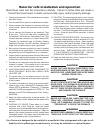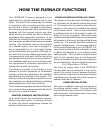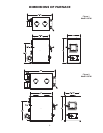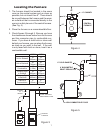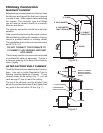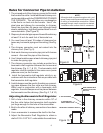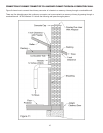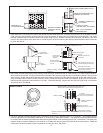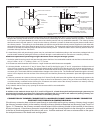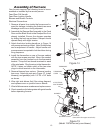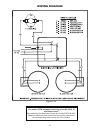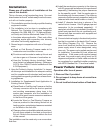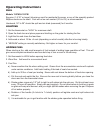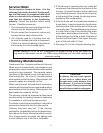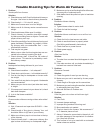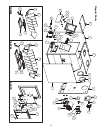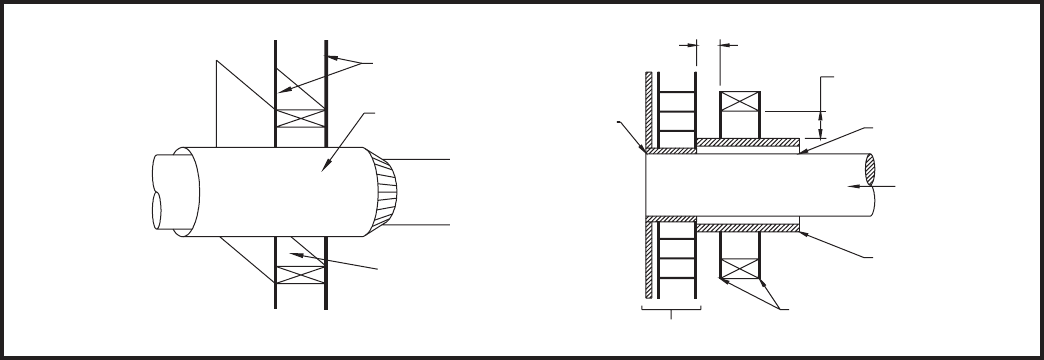
SHEET STEEL SUPPORTS
CHIMNEY SECTION
CHIMNEY
CONNECTOR
AIR SPACE
2 IN.
FIGURE 12, PART D
MINIMUM CLEARANCE
2 IN. ALL AROUND
CHIMNEY THIMBLE
1 IN. AIR SPACE TO
CHIMNEY LENGTH
MASONRY CHIMNEY CONSTRUCTED
TO NFPA 211
SHEET STEEL SUPPORTS
(24 GAUGE MIN. THICKNESS)
CHIMNEY FLUE
MINIMUM CHIMNEY CLEARANCES FROM MASONRY TO
SHEET STEEL SUPPORTS AND COMBUSTIBLES 2 IN.
CHIMNEY CONNECTOR
TO HEATER
SOLID INSULATED, LISTED
FACTORY-BUILT CHIMNEY
LENGTH (12 IN. LONG MIN.)
4. Use an 8" inside diameter solid insulated listed factory-built chimney length which has 1" or more of solid insulation. The minimum
length of this chimney section shall be 12" and will serve as a pass-through for the 6" diameter chimney connector. There must
be at least a 12" air space between the outer wall of the chimney section and any combustible materials. The chimney section
shall be concentric with and spaced 1" away from the chimney connector by means of sheet steel support plates on both ends of
the chimney section. The opening in the combustible wall shall be covered and the chimney section supported on both sides with
sheet steel supports which are at least 24 gauge (0.024") in thickness. The sheet steel supports shall be securely fastened to wall
surfaces on all sides and shall be sized to t and hold the chimney section. Fasteners used to secure chimney sections shall not
penetrate chimney ue liner. See Part D.
5. A listed factory-built wall pass-through system may be purchased and installed according to the instructions packaged with it to
provide a safe method of passing the chimney connector through a combustible wall for connection to a masonry chimney.
Additional requirements pertaining to Figure 8 and the above wall pass-through systems:
1. Insulation material used as part of wall pass-through system shall be of noncombustible material and shall have a thermal conduc-
tivity of 1.0 Btu • in./ft.² • °F (4.88 kg • cal/hr • m² • °C) or less.
2. All clearances and thicknesses are minimums: larger clearances and thickness are acceptable.
3. A chimney thimble, as shown for 3" and 4" above (Parts C and D) shall be for types "3" and 4" connections to facilitate removal
of the chimney connector for cleaning. The chimney thimble shall be of ASTM C315 reclay with 5/8" minimum wall thickness, or
material or equivalent durability. The inside diameter of the thimble shall be sized for the proper snug t of a 6" diameter chimney
connector pipe. The thimble shall be installed without damage to the chimney ue. The thimble shall extend through the chimney
wall to, but not beyond, the inner surface of the chimney ue and shall be permanently cemented in place with high temperature
cement.
4. A chimney connector to a masonry chimney, except for 2" above (Part B), shall extend through the wall pass-through system to the
inner face of the chimney ue, but not beyond. It does not have to be fastened in place so long as it cannot accidently be pulled
out of the chimney or shoved into the chimney ue. If fasteners are used to secure the chimney connector to a masonry chimney,
the fasteners shall not penetrate the chimney ue liner.
5. Any material used to close up any opening for the connector shall be noncombustible.
PART E - (Figure 12)
In addition to the methods shown by A, B, C, and D of Figure 12, a listed factory-built wall pass-through system may be
purchased and installed according to the instructions packaged with it to provide a safe method of passing chimney con-
nector through a combustible wall for a connection to a masonry chimney.
CONNECTION OF CHIMNEY CONNECTOR TO A MASONRY CHIMNEY WHEN CHIMNEY CONNECTOR
DOES NOT PASS THROUGH A COMBUSTIBLE WALL
If the chimney connector does not have to pass through a combustible wall to get to a masonry chimney, simply connect
the chimney connector directly to the masonry chimney's chimney thimble as described and shown by parts C and D of
Figure 12. Remember, the chimney connector should extend into the chimney thimble to the innerface of the chimney
ue but not beyond; if the chimney connector is extended through the chimney thimble into the chimney ue, resistance
to the ow of smoke and gases up the chimney will occur; that ow resistance will have an adverse affect on the opera-
tion and performance of the heater and venting system.



